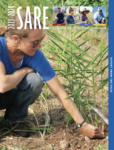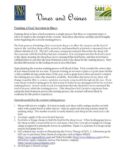Showing 1-4 of 4 results

2023–2024 Report from the Field
SARE grants havehelped our viabilityas a business anddemonstrated thatsmall businessescan make a positiveimpact on theenvironment when wedevelop relationshipswith each other forthe benefit of all. Jeanine SeabrookGlass Rooster Cannery Letter from the Director I have always appreciated the value of long-term research as well as the long-term impact of both applied and basic research. The core […]

Manage Weeds on Your Farm Video Series
In this series, experienced farmers from around the country talk about how they have found success controlling weeds by following ecological principles, and without resorting to the use of herbicides. To do so, they rely on a range of cultural and mechanical practices, including diverse crop rotations, well-timed cultivation and targeting weeds when they're at […]

The Power of Data: Improving the Management of Rangeland Ecosystems
California's rangelands face a wide range of challenges, from invasive species and pests to flooding and drought. Much of the knowledge of how to manage rangelands effectively resides in the personal experience of land managers. To capitalize on this collective wisdom, University of California Davis researchers partnered with ranchers around the region to compile a database of site-specific management information that can help everybody take better care of the land.

Trained Sheep Grazing Vineyard Floor
According to researchers, training sheep to have a food aversion is a simple process. However, there are important steps to follow to improve the strength of the aversion. This fact sheet describes the aversion training process.